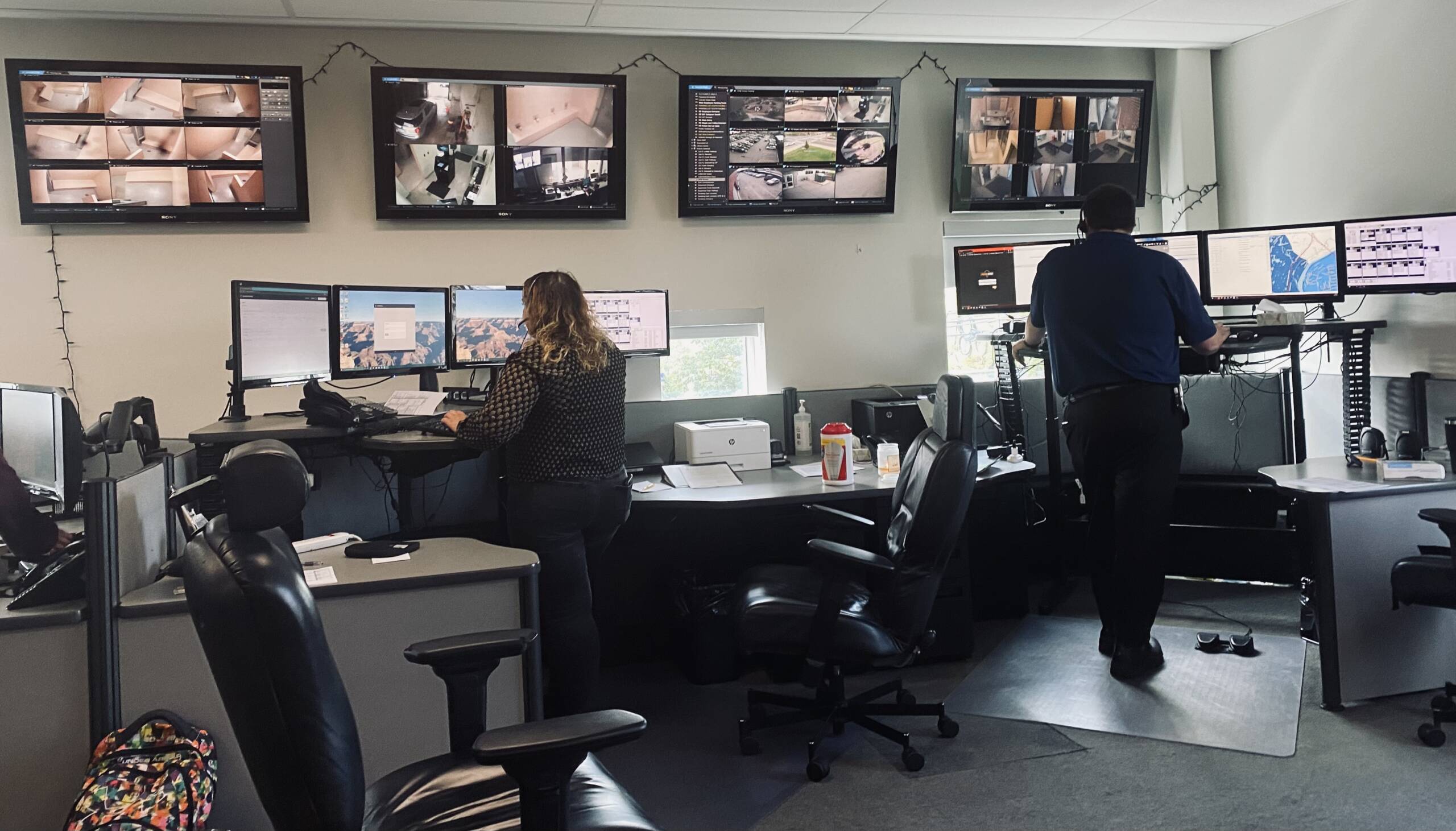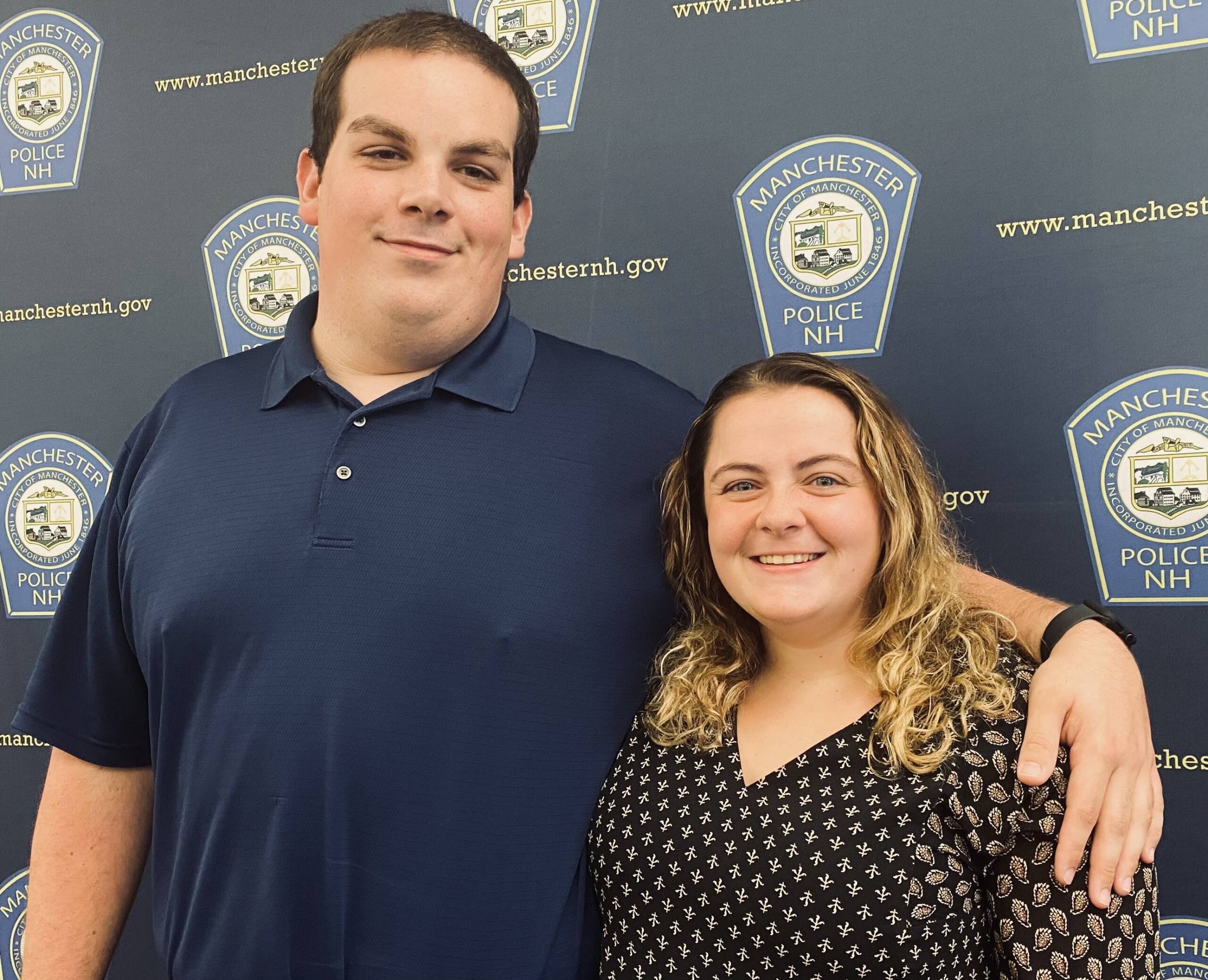
MANCHESTER, NH – Last Thursday at 3 p.m., Manchester Police Department dispatchers Alexa Perrotti, 27, and Matt LaDuke, 25, arrived at their desks to see 12 calls already stacked up awaiting officers’ arrival.
That’s the norm, says Supervisor Kristin Wilder.
One dispatcher, taking the calls, is on one concerning an 11-year-old who is being followed by someone in a truck who is screaming the “N” word at him and his friend. Police are immediately dispatched.
Dispatchers answering calls – an average of 261 per day, 70,213 so far this year — must obtain as much detailed information as possible from the caller: Name, location, what happened, anyone hurt, is a weapon involved. While doing that, the dispatcher is simultaneously researching the call itself – have police been to that location before, were there any threats and assessing the danger level to both the citizen and police. The information is needed to ensure both the safety of the caller and the officer.
“We actually do 99 percent of the research before an officer is sent out,” LaDuke said. There are five people in dispatch: a supervisor, two call takers and two radio dispatchers.
Calls are prioritized: shootings, car accidents with personal injury, ongoing assaults, armed robberies, go to the top of the queue. Others, such as a fender-bender with no injury, are a lesser priority.
Each dispatcher works with four monitors and on the wall above, are four more screens displaying a live feed of rooms and areas within the Valley Street police station and its exterior. They keep an eye on those as well.
At the supervisor’s station, there are additional screens to be monitored – channels detectives and others use exclusively. Wilder explains they are monitored to ensure the safety of the officers.
Dispatchers are multi-taskers times four.
Manchester Police Chief Allen Aldenberg said they are critical to the department’s everyday operation.
“Our dispatchers are an essential part of the Manchester Police Department,” he said. “Their jobs are stressful and they are more often than not the communication line between both callers and officers, and they are expected to remain calm while maintaining the ability to multi-task. Currently, we have vacancies within our Communications Division and this adds even more stress and work to their already difficult job. We are very thankful for their daily efforts and we know that we couldn’t do our jobs as well without them.”

And today they are down six, more than a third of what is needed in the Communications Division which has a full complement of 16 dispatchers.
Because of the shortage, one day last June, Perrotti was working alone when a high-risk traffic stop occurred. She had to answer officers’ numerous calls while calling other agencies involved and still monitor emergency calls that kept coming in.
“Obviously, other calls don’t stop so I was handling things while dealing with other agencies and looking up things,” she said. “You try to halt non-emergency calls when you are handling things like that when by yourself because you want officers to have the most information when they are going out.”
In July, she was named the department’s “Non-Sworn Employee of the Quarter,” an honor presented to her for her work on that felony stop but also for a May call where she convinced a wanted person to turn herself in.
Perrotti, who is originally from South Brunswick, N.J., says she comes from a family of police officers. She hopes to eventually be one as well. She has been working as a dispatcher for about 1½ years, having left a job as an assistant account manager of a gun company.
Last Thursday, she was working a double shift, her third that week. Supervisor Wilder is working a double shift as well.
They say dispatch is one big family, with everyone helping each other out. If needed, someone will come in a couple of hours early or split a shift if someone has something they have to do.
“We try to accommodate one another although sometimes it doesn’t work out,” said Perrotti.
On the day shift, the average number of calls is 90, while the 3 to 11 shift handles the most – 112. The last shift is the slowest, an average of 59 with most calls logged as nightclubs close and Elm Street fills with people heading home.
Statewide, LaDuke said there is a backup system in place where if a call isn’t answered after five rings it is transferred to another agency. In Manchester, it is the Manchester Fire Department that takes the emergency call.
LaDuke is originally from Lancaster and worked for about two years as a dispatcher with the Grafton County Sheriff’s Office before being hired by Manchester police. He also worked part-time dispatching for four different fire departments in the Great North Woods.
He said there are many things that are rewarding about the job. One time, he said, he was on a call with a woman for 45 minutes who had been beaten by her husband. She was hesitant to call police, he said, and wouldn’t give him her name or say where she was. LaDuke said he continued talking to her, telling her he wanted to be sure she was OK.
“Eventually, she opened up and said who she was and what had happened,” he said. “We were able to take him (the husband) into custody.”
There are times when the job can be extremely stressful, like March 28, 2019, where there was a 14-hour police stand-off at the Quality Inn in which three people died. It was one of the biggest nights for LaDuke.
“I was on the primary radio for that,” he said. “It was a long, drawn-out night.”
He said it was not only stressful for those in dispatch but for those who were “working it on the outside, people on the scene.”
Perrotti said the one thing a dispatcher needs is patience.
“You definitely need a lot of patience,” she said. “That doesn’t mean just from calls, but officers on the road also can sometimes get really stressed with what they’re seeing and what they’re dealing with. Sometimes even working with your partner things can get miscommunicated and you get frustrated, so you have to have a lot of patience”
Multi-tasking is a must as well, she said. “If you can’t multi-task, then you can’t develop patience,” she said. “It’s not for you.”
LaDuke said a dispatcher also has to be able to work as a team.
“Our number-one goal in that room is safety and that the officer goes home at night and that Manchester’s citizens are safe,” he said. That takes teamwork.”
Anyone interested in applying for a police department should go to the city’s website. Job applications are handled through the city’s human resources department.







